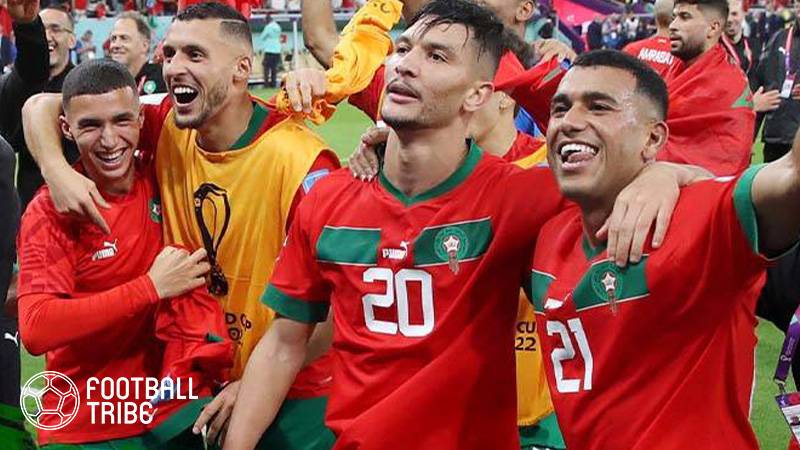
Morocco’s 2-0 defeat at the hands of France on Wednesday ended the African nation’s unlikely dream of winning the 2022 FIFA World Cup, but nevertheless the Atlas Lions have managed to capture the imagination of many and became a beacon of inspiration for not only Africa, but also the Middle East region.
It’s only fitting that the first World Cup to be held in a Middle Eastern country has a Middle Eastern representative going far into the competition, and despite the eliminations of hosts Qatar, Saudi Arabia, Iran, and Tunisia in the group stages as well as the failure of the likes of the United Arab Emirates, Iraq, Syria, Egypt, and Algeria in qualifying for the World Cup, the Middle East region as a whole still had a successful World Cup campaign in the form of Morocco’s unlikely run to the semifinals.
Morocco’s feat was made even more remarkable by the fact that the Atlas Lions had a turbulent preparation for the World Cup, with Bosnian head coach Vahid Halilhodzic leaving the team after a bust-up with Chelsea winger and national team talisman Hakim Ziyech.
Replacing Vahid was Walid Regragui, fresh from winning the 2021/22 CAF Champions League with Wydad Casablanca. Walid’s presence calmed the tensions within the Morocco squad, with Ziyech returning to the national team setup after previously announcing his retirement following his fall-out with Vahid.
Morocco’s World Cup campaign saw them being represented by those from the country’s diaspora spread across Europe, with 14 of their 26 players being born outside of Morocco. These players had made a name for themselves in European football – the aforementioned Ziyech having been honed by Ajax Amsterdam despite being sparingly used in Chelsea, while star goalkeeper Bono and winger Youssef En-Nesyri were key players at Sevilla. Achraf Hakimi spent his career at European giants Real Madrid, Borussia Dortmund, and Inter Milan before moving to Paris Saint-Germain in 2021. Last but not least both captain Roman Saiss and Sofiane Boufal were Premier League alumni, the former having turned out for Wolverhamption Wanderers while the latter was a former Southampton player.
The Atlas Lions were drawn into a tough Group F with 2018 runners-up Croatia, heavy favorites Belgium, and minnows Canada, and many thought that both Morocco and Canada would prop up the group. Walid’s men had other ideas, however, forcing Croatia to a 0-0 draw before spectacularly beating the Belgians 2-0, with a 2-1 win over Canada ensuring qualification into the knockouts as group winners.
Being drawn against Spain in the round of 16, many would thought that Morocco’s World Cup journey would end there and there. But against all odds, Morocco managed to withstood their more illustrious opponents, forcing them to a goalless draw after 120 minutes before beating them 3-0 on penalties.
And of course, who could forget Morocco’s stunning performance in the quarterfinals where they eliminated Portugal 1-0 thanks to a first half header from En-Nesyri, a result that sent Cristiano Ronaldo into tears as it was a cruel end to what could be his last chance for World Cup glory?
Despite their overachievement, one thing that stood out the most from Morocco – which won them admiration worldwide – was their humility after each win. Players such as Hakimi and Boufal did not forget to thank their families for being always with them through thick and thin, with the two players embracing and dancing with their mothers after the referee had blown for full-time. The Morocco squad also did not forget to prostrate to God after every match, as a show of gratitude towards His grace.
Tactically wise, Walid’s Morocco side relied heavily in their defense. Prior to their defeat in the semifinal at the hands of France, Morocco had only conceded one goal throughout their World Cup campaign, an own goal in their win against Canada. Goalkeeper Bono showed the world why he won the award for best goalkeeper in the 2021/22 La Liga season, while Hakimi, Saiss, and West Ham United’s Nayef Aguerd did their business in the defense. And while Bayern Munich’s Noussair Mazraoui completed a compact-looking back four, an injury prior to the quarterfinal meant that his place was given to an equally-impressive Yahya Attiyat-Allah, one of the three Wydad players included in the squad.
In the midfield engine, Walid relied upon Fiorentina’s Sofyan Amrabat, younger brother of former Watford winger Nordin, as well as Standard Liege’s Selim Amallah and Angers’ Azzedine Ounahi, both of whom could be hot targets in the upcoming transfer market.
And to complete the lineup, Walid entrusted attacking duties to Ziyech, En-Neysri, and Boufal, all of whom having established themselves in the cutthroat world of European football.
Morocco’s close proximity to Qatar meant that each of the Atlas Lions’ match felt like they’re playing back home at either Marrakech, Casablanca, or Rabat. This was due to an overwhelming amount of Moroccan supporters who came straight from the country to Qatar, all thanks to national carrier Royal Air Maroc providing extra flights to Doha from Casablanca. Moreover, supporters from other Middle Eastern nations such as Palestine began throwing their support for Morocco as well, further spurring them on through their incredible run.
But in the end, all good things must come to an end and Morocco, despite fighting valiantly against the defending world champions, were eliminated by France in the semifinal. Injuries to Aguerd, Mazraoui, and captain Saiss would prove to be too much for the Atlas Lions and they buckled in the 5th minute from a scrambled goal by Theo Hernandez, and despite fighting valiantly Morocco’s resistance finally fell in the 79th minute after a Randal Kolo Muani strike settled the game once and for all.
Morocco and their fans did not care though. Just getting into the semifinal alone was a huge achievement for the Atlas Lions and regardless of the result from Saturday’s third place play-off against Croatia, Morocco had made both Africa and the Middle East proud with their World Cup run.

